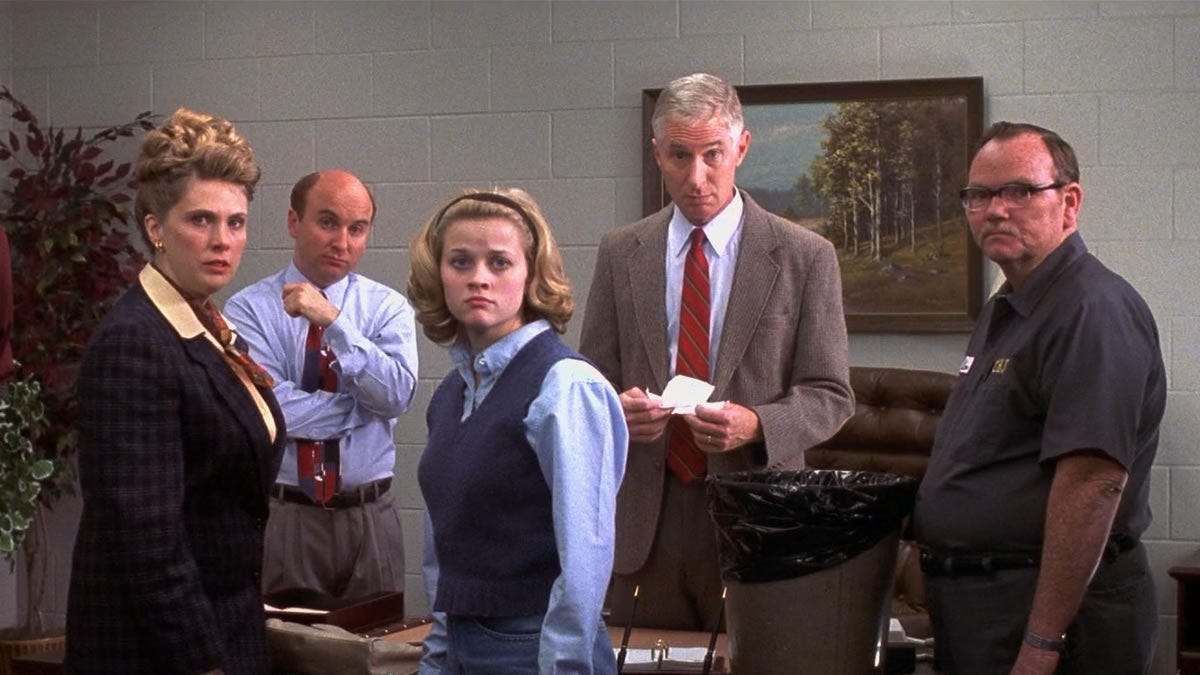Reaction Shots: Sacha Baron Cohen goes full Drumpf and post-Trump film criticism
Plus the Movie of the Week is Election (1999) and the Noah Berlatsky Award for Bad Takes.
Borat 2 Not very nice!
There is only one way to interpret Borat Subsequent Moviefilm, or simply Borat 2: Sacha Baron Cohen is a massive hypocrite. For Cohen to have a sequel of his most famous character, tying it to, not simply an election year, but around an election week, sniffs of astroturfing. No longer is it a fish-out-of-water tale of a Middle Eastern man. It’s an expose of the transformation of America.
I was not a fan of Borat, when it first came out in 2006, but I can understand the appeal. It wasn’t simply a movie in which a journalist from Kazakhstan comes to a Bush-era America and observe its people on a government assignment while pursuing Pamela Anderson. Ultimately, the moral of the story is that the Americans he meet, as eclectic and crazy as they can be, are pretty tolerable people. As Christopher Hitchens pointed out in his review then, the only group that felt the pure offense was the Veteran Feminists of America. Everyone else seems to pass the provocation off, whether or not they know that they were the joke. Whether that accomplishes as an expose of America, seems less relevant in contrast to his bumbling and frequently tasteless persona on display.
Fourteen years later, Borat 2 is set in an America that’s more chaotic and is on the verge of a pandemic. The character is in touch with QAnon activists, bakers obliged to make the cake over anything, a Republican women’s group, and Rudy Giuliani. He also has a teenage daughter named Tutar, who he has to send for Mike Pence to marry. Perhaps the peak of this is Rudy Giuliani, almost getting along with the daughter, but everyone else doesn’t really seem to care that much when Borat makes them do absurd stuff like putting “Jews Will Not Replace Us” on a cake.
With seven credited screenwriters, it’s clear that the laziness has infected two of its narrative modes: the fly-on-the-wall mockumentary format wears out its novelty, where Borat pulls stunts with normal people having crazy opinions. As with the first movie, they don’t have an issue with his presence, which if Cohen wants to expose, he really should have gone far enough. The second is its core focus between him and Tutar, which judging by the depth of the screenplay, is pretty easy to bounce off. I wouldn’t say that Maria Bakalova’s debut is of flying colors - some of her scenes, particularly when she turns into an alt-media commentator, felt a bit contrived - but she has the funniest bits in the movie, mainly by exploiting the gross-out parts of her heritage.
Borat 2 demonstrates Cohen’s hubris as a public figure. He has been outspoken about the right-wing disinformation spread across social media and demand big tech companies to intervene (only to discover getting censored in the process), while hoaxing his opponents for laughs. In one scene, his daughter discovered Holocaust denial on Facebook, leaving him distraught. Notoriously, he gets Tutar to beclown Rudy Guiliani himself. But for what? To prove the carelessness among right-wingers, and that they need to be stopped? Cohen is not interested in developing his own character but to finger point to an administration that he has disdain for. We already have late-night talk show hosts to do this job. What use is there for a product already born out of the 2000s?
What does post-Trump criticism look like?
The election was a nailbiter in a year of many nailbiters. After four days, Joe Biden will be America’s next president, with Trump having bitterly lost. [At least until he really wants to go all the way to SCOTUS to overturn it]. I am interested in what effect would a Biden presidency have on film (and at large, cultural) criticism. Can a need for “healing” possibly de-politicize reviews? Or will that not change, in spite of a Democrat in charge?
I have listened to Sonny Bunch’s podcast at The Bulwark with his former chums Alyssa Rosenberg of The Washington Post and Peter Suderman of Reason Magazine, and I recommend checking it out, especially the last third of the episode, where they discuss cultural coverage after Trump. Bunch and Sunderman noted how increasingly partisan some critics have become and that the quality of writing took a nose dip once activist lens is left unchecked or encouraged by editors who should know better. A template like this would include decrying a movie for not being diverse enough or when the cops aren’t dissected further with disdain. I agree with Rosenberg, a critic of a progressive bent, who says that it has become necessary for art criticism to be more readable that way, not just for writers, but with creators, so that their ideas would need to be expressed in a way that writers can bounce off of this.
However, film criticism’s political endeavors always felt like a punchline, not because of the relationship itself or that they’re two different playing fields, but because of how it approaches it. Suderman points to the example of Michiko Kakutani, The New York Times’s main book critic (and a very influential one at that), who quit the paper because they wouldn’t allow her to have a political column. So it’s easy to presume that most film critics have been left-wing partisans during Trump’s reign and they write for themselves. On Twitter, they LARP like hysterical activists believing that anyone living in their New York neighborhood who are to the right of Alexandria Ocasio Cortez and Bernie Sanders is enabling fascists. If someone like Richard Brody, who spends much of his lifetime as The New Yorker’s film critic, accusing movies he doesn’t like of not holding a desirable political slant, then it deserves derision.


But these biased tics and groupthink are not borne out of Orange Man Bad. It has always been bubbling in reviews regardless of who’s the president. Pauline Kael infamously said that Dirty Harry was fascist, while Roger Ebert applied that label to Death Wish and Fight Club. The tendency to slander films with labels that have extremist implications (and is spoken by someone with no education on the said label), is seen in contrast with the belief that movies ought to push an agreeable viewpoint. This is the opposite of good writing, in a way that’s reductive, simplistic and often self-satisfied. So far, my first (and only) assumption of cultural criticism during Biden’s terms would be this will not change, especially when social media is still a prominent tool for spectating culture.
Movies like Dragged Across Concrete and Joker have proved that the movies can inspire poor criticism, regardless of its quality, when the worst presumptions are made about its supposed politics and is met with preemptive derision. As film scholar Adrian Martin once wrote in an essay for The Australian Quarterly, “Taking offense, is a peculiarly self-theatrical, melodramatic. histrionic gesture in the annals of criticism.”
I’ll write a very long piece that further examines the rights and wrongs of writing during the age of Trump, which would include the economic incentives that are sometimes overlooked for the clickbait. But for now, the short version of this is that I hope that people would understand why “the political is personal” mantras are double-edged swords that tend to blind the imagination.
Movie of the Week: Election (1999)
In the wake of recent events, I’m going to stick with a movie that’s hilarious and rather relevant, not simply for its potential limousine politics, but how much that derives from our personal problems. There are main characters who exist with differing, but fundamental tics in their egos that manifest into the electoral system. Reese Witherspoon is spectacular as Tracy Flick, an overachieving girl who annoys everyone with her campaign, but Matthew Broderick is simply perfect for the role of Jim, a disgruntled teacher who sees her as a talisman for terrible things. I can certainly imagine that this is who Ferris Bueller and his self-satisfied persona would grow up to become. What’s important is the perspectives of each character are given footing, so it isn’t simply a movie about petty revenge. Instead, it looks at how the vapidness of the system feeds off from the bickering of each candidate and the emptiness of their agendas. A student election, in which Jessica Campbell’s Tammy faces off against his dopey jock brother for taking away her girlfriend. In other words, we all live on campus now.
The Noah Berlatsky Award for Bad Movie Takes
One great thing about 2020? Not a single Marvel movie came out, and instead, we get this.








